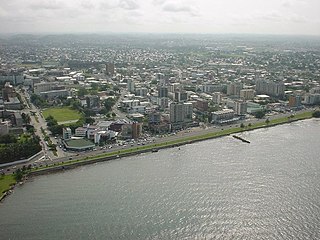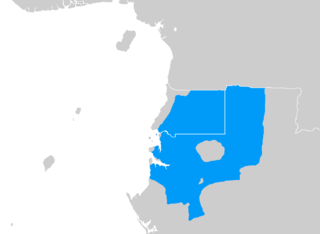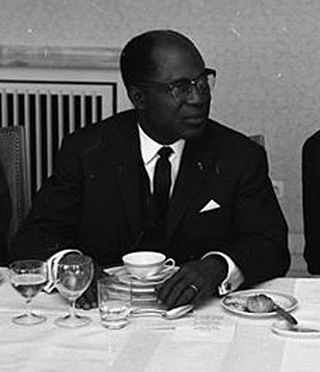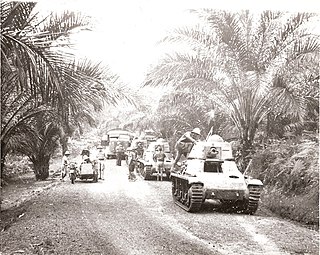
The Armed Forces of Gabon, officially the Gabonese Defense and Security Forces, is the national professional military of Gabon, divided into the Army, Air Force, Navy, and a National Gendarmerie, consisting of about 5,000 personnel. The armed forces includes a well-trained, well-equipped 1,800-member guard that provides security for the President of Gabon.

Gabon has followed a non-aligned policy, advocating dialogue in international affairs and recognizing both parts of divided countries. Since 1973, the number of countries establishing diplomatic relations with Gabon has doubled. In inter-African affairs, Gabon espouses development by evolution rather than revolution and favors regulated free enterprise as the system most likely to promote rapid economic growth. Concerned about stability in Central Africa and the potential for intervention, Gabon has been directly involved with mediation efforts in Chad, Central African Republic, Republic of Congo, Angola, and former Zaire. In December 1999, through the mediation efforts of President Bongo, a peace accord was signed in the Republic of Congo between the government and most leaders of an armed rebellion. President Bongo has remained involved in the continuing Congolese peace process. Gabon has been a strong proponent of regional stability, and Gabonese armed forces played an important role in the UN Peacekeeping Mission to the Central African Republic (MINURCA).

Libreville is the capital and largest city of Gabon, located on the Gabon Estuary. Libreville occupies 65 square kilometres (25 sq mi) of the northwestern province of Estuaire. Libreville is also a port on the Gabon Estuary, near the Gulf of Guinea. As of the 2013 census, its population was 703,904.

Gabriel Léon M'ba was a Gabonese politician who served as both the first Prime Minister (1959–1961) and President (1961–1967) of Gabon.

Fang is a Central African language spoken by around 1 million people, most of them in Equatorial Guinea, and northern Gabon, where it is the dominant Bantu language; Fang is also spoken in southern Cameroon, the Republic of the Congo, and small fractions of the islands of São Tomé and Príncipe. It is related to the Bulu and Ewondo languages of southern Cameroon.

Jean-Hilaire Aubame was a Gabonese politician active during both the colonial and independence periods. The French journalist Pierre Péan said that Aubame's training "as a practicing Catholic and a customs official helped to make him an integrated man, one of whom political power was not an end in itself."

Léon Mébiame was a Gabonese politician who was the 2nd Prime Minister of Gabon. From 1975 to 1990, he served as the longest-serving Prime Minister in Gabonese history, at 15 years and 17 days.

The Battle of Gabon, also called the Gabon Campaign, occurred in November 1940 during World War II. The battle resulted in forces under the orders of General de Gaulle taking the colony of Gabon and its capital, Libreville, from Vichy France, and the rallying of French Equatorial Africa to Free France.

Education in Gabon is largely based on the French educational system. On the federal level, it is regulated by two Ministries: the Ministry of Education, which is in charge of Pre-school through to High School, and the Ministry of Higher Education and Innovative Technologies, which is in charge of universities and professional schools.
Omar Bongo University is a public university which was founded as the National University of Gabon in 1970. It was renamed in honor of President Omar Bongo in 1978. It is based in Libreville, and was the country's first university. It is Gabon's largest university and around 30,000 students are enrolled there (2020).

Local elections were held in Gabon on April 27–30, 2008, with 1,990 municipal and departmental councillors being elected.

Paul Marie Indjendjet Gondjout was a Gabonese politician and civil servant, and the father of Laure Gondjout, another prominent Gabonese politician. Gondjout was a member of the Mpongwe ethnic group, and served in the French colonial administration from 1928, and founded the Cercle amical et mutualiste des évolués de Port-Gentil in 1943. He was a delegate to the French Senate from 1949 to 1958, and founded the Gabonese Democratic Bloc (BDG). In 1954, Léon M'ba joined the party and eventually overthrew Gondjout as leader.
Louis-Emile Bigmann (1897–1986) was a Gabonese politician and former President of the National Assembly of Gabon.
Jean Félix-Tchicaya was a Congolese politician in the French colony of Middle Congo. He was born in Libreville on November 9, 1903, and was a member of the royal family of the Kingdom of Loango.
The Adyumba or Adjumba are a Bantu ethnic group in Gabon. They live mainly near Lake Azingo and in the Middle Ogooué River in the west coast of the country. They belong to the Myènè people and also speak the Myènè language of the Bantu languages. Their neighbors include the Mpongwe people and the Nkomi people. Today most live by fishing, food crops and small businesses.

Most visitors to Gabon must obtain a visa in advance, either from one of the Gabonese diplomatic missions or online, unless if they are a citizen of one of the visa-exempt countries.
Santé Diabète (SD) is a French non-governmental organization (NGOs) whose headquarters is in Grenoble (France) which is working on strengthening health systems to improve the prevention and management of diabetes in Africa. As part of a chronic disease like diabetes, improving the quality of care saves thousands of lives but also improves the quality of life for people living with diabetes.
The African nation of Gabon has had human inhabitants for perhaps 400,000 years. Bantu peoples settled here from the 11th century. The coastline first became known to Europeans through Portuguese and Dutch sailors. Colonised by the French in the 19th century, Gabon became independent in 1960.
The following is a timeline of the history of the city of Libreville, Gabon.










